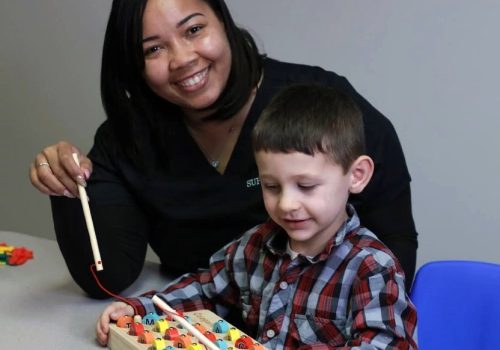As they develop, children have an instinctive desire to explore their environment, feel a sense of belonging, and be accepted amongst their peers. Their primal instincts drive them to test the boundaries of their mobility, and when they recognize that they drastically lack the mobility and skills of their peers, it has a detrimental effect on their mental health and social well-being.
Limitations in mobility and deficits in gross motor skills could arise from a variety of reasons, and in this article, we will explore some of the most widely recognized reasons that limit the range of motion in children and how physical therapy can remedy mobility challenges amongst children.
Overuse injuries
Acute injuries occur due to a single event, also known as macro trauma. Examples of these injuries include wrist fractures, shoulder dislocations, hamstring muscle strain, etc. On the other hand, overuse injuries refer to muscle or joint injuries that result over time due to micro-trauma. Examples of overuse injuries include tennis elbow, runner’s knee, swimmer’s shoulder, etc.
The human body is very resilient and flourishes under the right conditions of strain. Remodeling is the process where the body grows stronger through the breakdown and build-up of tissue. If the build-up side of the remodeling equation is slower than the breakdown side, overuse injuries occur.
Unlike acute injuries, the risk of overuse injuries can be mitigated through education and the application of good exercise practices. When they do occur, it is best to see a doctor who can diagnose the injury or refer you to a specialist who will take the matter further.
Physical therapy plays a big role in both preventing overuse injuries and treating overuse injuries. With the correct treatment and guided exercises, the healing process is sped up, and the patient will recover faster.

Developmental delays
When the development of a child in vital mental and physical areas is slower than the average of other children of the same age, it is categorized as a developmental delay. These delays can be observed in numerous areas of development, ranging from self-care skills, speaking, motor skills, thinking, and even playing.
This is not an uncommon phenomenon. Recent studies from the CDC revealed that 17% of children between three to seventeen years old have experienced developmental delays. On the bright side, with enough care, patience, and proper treatment, most children will jump back and function equally to their peers.
Physical therapists assess motor development using standardized testing for age equivalents and also evaluate strength, posture, flexibility, balance, and coordination. With the proper observation, evaluation, and treatment plan consisting of clear developmental goals, physical therapists help children bounce back to align themselves with their peers from a developmental perspective.
Head injuries
Traumatic brain injuries can leave patients incapacitated and reduce motor functions dramatically. Physical therapy can help restore independent movement by assisting neuroplasticity. Our central nervous systems recognize their own circuitry thanks to repetitive behavior.
When an individual suffers a traumatic brain injury, leaving a loss in motor skills, physical therapy can help patients recover by repeating specifically targeted exercises. That is why you will find that sometimes physical therapists will have patients do the same exercises over and over. It promotes neuroplasticity and helps the brain to correct those neuropathways that might have been compromised following the injury.
Apart from the neuromuscular re-education mentioned above, physical therapists also assist with passive exercises, vestibular training, constraint-induced movement therapy, aquatic therapy, and more. For more information regarding head injuries and physical therapy treatments, please contact us by completing the form below.

Muscle disease and genetic disorders
The diseases and disorders that affect the human muscle system include muscular dystrophy, neuromuscular conditions, and neuromuscular disorders, all referred to as muscle disorders. The main outcome of these disorders is muscle and skeletal weakness.
Muscular dystrophy refers to diseases that cause the weakening of muscles over time. Symptoms, rate of progression, severity, and age of symptom development vary according to the specific type of muscular dystrophy.
Mostly muscular dystrophy is caused by a genetic mutation. However, there are certain cases that develop spontaneously without a link to a genetic mutation. Unfortunately, there is no cure for muscular dystrophy at this point in time, but proper treatment plans can reduce the speed of progression.
Physical therapy can help reduce the speed of muscular dystrophy progression, improve mobility for longer and therefore improve the overall quality of life of patients suffering from this muscle disease. Physical therapy treatment plans for muscular dystrophy may include passive stretching, breathing exercises, electrical muscle stimulation, and exercises to prevent muscle atrophy.

Where do I get physical therapy?
After a diagnosis of any of the previously mentioned conditions, a physician would refer a patient to a physical therapist for further evaluation, assessment, and treatment. In certain cases, as is the case with overuse injuries, patients might be aware of a reoccurring injury, for example, and source a physical therapist themselves.
Patients would then search online, contact acquaintances that underwent physical therapy, consult the American Physical Therapy Association (APTA) Directory, or any other sources at their disposal. We highly recommend that you consult your physician first for a professional diagnosis and peace of mind.
SuperPSYCHed Support offers physical therapy, occupational therapy, speech therapy, sensory integration, and group therapy. Some of our physical therapists have decades of experience and offer support for a wide array of treatments. We also accept most insurance plans.
Contact us by sending us a message or call us at 219-750-9600 for more information regarding our physical therapy offerings.




